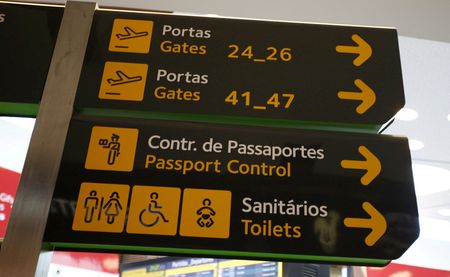 1
1 1
1

By Sergio Goncalves
LISBON (Reuters) – Around 60 flights were cancelled at Lisbon airport on Sunday, the last day of a strike by handling workers that has brought more disruption to summer travel at Portugal’s main airports since Friday, data from national airports operator ANA showed.
Employees of handling company Portway are demanding better holiday pay and more career progression. ANA’s website showed 31 arrivals and 28 departures had been cancelled on Sunday at Lisbon, Portugal’s busiest airport.
Pedro Figueiredo, spokesman for the National Union for Civil Aviation Workers (SINTAC), told Reuters that around 90% of Portway’s ramp operations workers at Lisbon and Porto airports were taking part in the three-day strike.
SINTAC expects between 70 and 80 Lisbon flights to be cancelled on Sunday and 30 to 40 at Porto airport, he said.
ANA did not show any flight cancellations at Porto, Faro – which serves the tourism-dependent region of the Algarve – or Funchal on the island of Madeira.
“In the coming days, our union will evaluate the results of this strike and we may adopt news forms of fight,” Figueiredo said, without elaborating on what they might be.
Handling workers assist airlines with baggage and also push planes onto the tarmac.
Scores of airport ground staff have protested across Europe this summer to demand higher pay to cushion the pain of rampant inflation, emboldened by booming demand for air travel and staff shortages after most COVID-19 restrictions were lifted.
Airlines are meanwhile grappling with soaring fuel prices and airspace closures related to the war in Ukraine.
The strike took place on one of the busiest weekends of the year, with foreign and Portuguese tourists still travelling for summer vacations.
Portway, which is owned by French group Vinci, said the “irresponsible” strike would jeopardise Portugal’s tourism sector, which accounted for almost 15% of gross domestic product before the COVID-19 pandemic.
(Reporting by Sergio Goncalves; Editing by Catherine Evans)